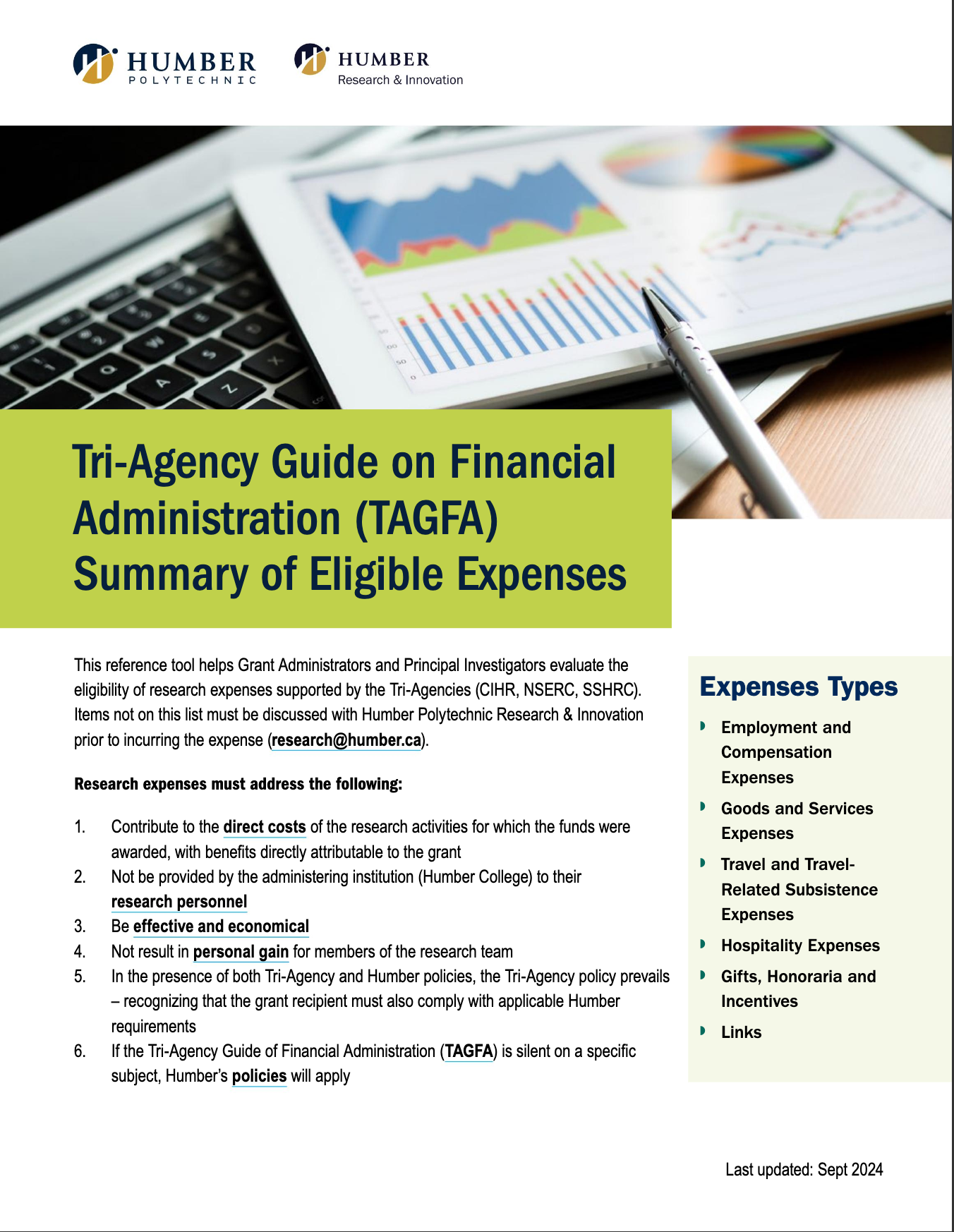Understanding TAGFA: A Guide for Humber Researchers
Purpose of Tri-Agency Guide on Financial Administration (TAGFA)
Referred to as the Tri-Agencies, The Canadian Institutes of Health Research (CIHR), the Natural Sciences and Engineering Research Council of Canada (NSERC), and the Social Sciences and Humanities Research Council of Canada (SSHRC), have specified the new principles-based Tri-Agency Guide on Financial Administration (TAGFA) for research expenditures with the following objectives:
- Promote efficiencies
- Reduce administrative burden
- Provide greater flexibility to administering institutions and grant recipients in ensuring the appropriate accountability and use of grant funds
TAGFA is effective April 1, 2022, at Humber College.
Four TAGFA Principles
The four key principles in the TAGFA indicate that grant expenditures must:
- Contribute to the direct costs of the research activities for which the funds were awarded, with benefits directly attributable to the grant
- Not be provided by the administering institution to their research personnel
- Be effective and economical
- Not result in personal gain for members of the research team
Five TAGFA Directives
The TAGFA includes five directives (mandatory requirements) for the following research expenditure categories:
- Employment and Compensation expenditures
- Goods and Services expenditures
- Travel and Travel-related subsistence expenditures
- Hospitality expenditures
- Gifts, Honoraria, and Incentives expenditures
The directives provide a framework for administering institutions and grant recipients to exercise sound judgement and due diligence concerning the use of agency grant funds.
Order of Precedence When Evaluating an Expense
When evaluating an eligible expense, below is the order of precedence and interpretation, applicable to Tri-Agency funded grant expenditures:
- The Agreement on the Administration of Agency Grants and Awards by Research Institutions
- Tri-Agency program/funding opportunity specific literature
- Any relevant agency agreements with grant recipients and/or administering institutions, if applicable
- The TAGFA
- Humber College's Policies and Procedures
The Tri-Agency policy prevails; however, the grant expense must also comply with applicable institutional requirements. If the TAGFA is silent on a specific subject, Humber College's policies and procedures are followed.
Equity, Diversity and Inclusion (EDI)
- Humber College is responsible for recognizing the importance of EDI in its policies and practices.
- Grant recipients are responsible for ensuring that they carry out their grant activities in accordance with Humber's and Tri-Agency's EDI policies and practices.
- Tri Agency's commitment to EDI is captured in the Tri Agency Equity, Diversity and Inclusion Action Plan
About the Research Support Fund
Every year, the federal government invests in research excellence in the areas of health sciences, engineering, natural sciences, social sciences and humanities through its three granting agencies. The Research Support Fund reinforces this research investment by helping institutions ensure that their federally funded research projects are conducted in world-class facilities with the best equipment and administrative support available.
Direct costs: essential expenditures that would not have been incurred had the grant not been undertaken. Accordingly, they can be directly assigned to the grant activities with a high degree of accuracy.
Indirect costs: the operational costs that underpin an institution’s research activities (i.e., heating, lighting, ethics reviews, facilities for animals used in research, management of intellectual property, environmental assessment and safety compliance). The services that give rise to indirect costs are institutionally based and are not specific to individual research grants.
Notional amount of RSF grant for 2024-2025: $40,550
Overview of how Humber proposes to allocate its grant funds under each of the five expenditure categories based on the notional amount:
- Notional Amount: $40, 555
- Research facilities: $0
- Research resources: $20, 277
- Management and administration of the institution's research enterprise: $20, 278
- Regulatory requirements and accreditation: $0
- Intellectual property and knowledge mobilization: $0
Read more at Research Support Fund, About the program
Resources
Have Questions?
Contact your Humber College Office of Research & Innovation representative or email research@humber.ca

.png)
